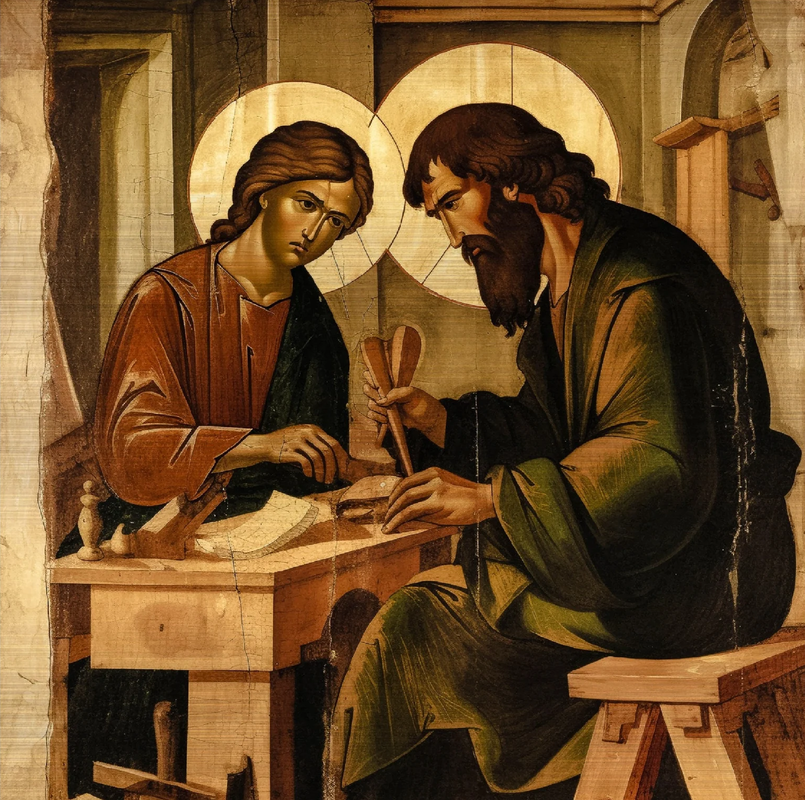In discovering her truest vocation, Saint Therese of Lisieux, recognizing her littleness, exclaimed that her calling was to be "Love in the heart of the Church." And it is this love which is at the core of all vocations. The voice of God is not in the driving whirlwind but the whisper from the depths of the cave - a voice so gentle that it can easily go unheard in the noise and attractions of the outside word. But if we desire to respond to the voice of God who invites the soul to a more intimate place with Him, we must necessarily abandon the delights of the surface world for the darkness of the cave. In our fallen nature, however, the descent into the cavern of our souls is often less of a quiet repose than it is a treacherous spelunking into the unknown. It is a place we find is often overrun with vermin and creeping things. The adventure, the battle, is a revelatory and purifying one that requires perseverance, hope, and the knowledge that though we advance in darkness, God leads us with perfect clarity. Some consider the final vows of the monastic to be the closest thing to a second baptism, and truly, to go into these depths is to begin a new sort of life, and like a newborn child, neither to the realm of nothingness nor to the womb of ignorance may we ever return.
The vision of our Laura is one that will include both brother and sister hermits living in separate quarters. We do not engage in outside ministry (with the exception of a priest who may need to offer mass at a local parish or bring communion to the sick or home bound) our vocation is not active, but contemplative.
The vision of our Laura is one that will include both brother and sister hermits living in separate quarters. We do not engage in outside ministry (with the exception of a priest who may need to offer mass at a local parish or bring communion to the sick or home bound) our vocation is not active, but contemplative.
Requirements
Protocol for new candidates is still being discussed. However, a few things are necessary:
- Attraction to a life of contemplative prayer and the Liturgy of the Hours
- Attraction to a mixed life that will include long hours of solitude but also communal prayer, work, and recreation
- Attraction to Carmelite Spirituality
- Good common sense, fair health, mental stability, and emotional maturity
The Hermitage of Saint Joseph is in its infancy. For those inquiring about a vocation, it is important to note that there is no permanent housing currently available. If you have discerned that our way of life is one that you have been called to, or have questions we have not answered, please remit a letter via postal service to:
The Hermitage of Saint Joseph
Br. Richard Withers OCDS
1056 Williams Way
Coatesville PA, 19320
Br. Richard Withers OCDS
1056 Williams Way
Coatesville PA, 19320
Rule
Each hermit will follow a plan of life drafted according to their own needs. In the process of public consecration, this plan of life will be submitted for approval by the local bishop, and once approved, will become canon for that individual.
As a group, however, the Laura will be regulated by the Albertine rule and each hermit will be formed in Carmelite spirituality both through periodic meeting within the setting of the the hermitages as well as monthly with a group of Third Order (secular) Discalced Carmelites. |
Legal
|
|
|
A publicly consecrated hermit lives according to Canon 603 and the Church recognizes those hermits who are under private vows as having a legitimate vocation to a solitary life of prayer. Canon law allows for the formation of Lauras - the commentary essentially ends here. A Laura, or colony of hermits is a diocesan entity - the individual hermit, once publicly consecrated, is obedient to the local bishop. We are not an Institute of Religious Life nor are we affiliated directly with any Religious Order.
|

